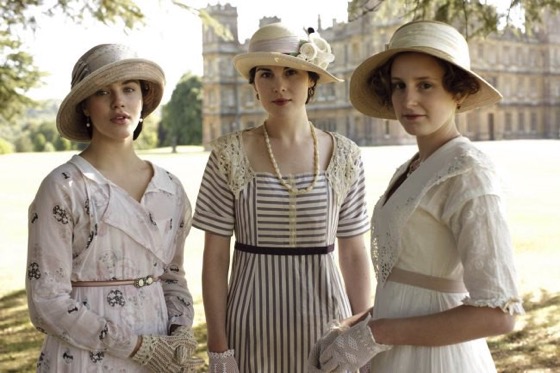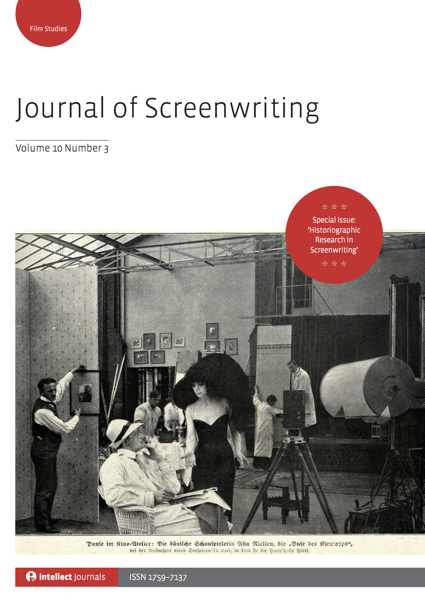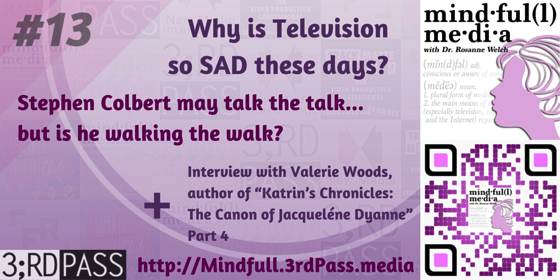Mindful(l) Media is an audio podcast from Dr. Rosanne Welch helping the audience to be more Mindfull about the Media we both create and consume as it relates to the portrayal of Gender, Diversity, and Equality.

Subscribe via iTunes today | Visit the Mindful(l) Media for more articles

Mindful(l) Media: Is the proliferation of feminists in historical dramas good or bad for modern young women? by Dr. Rosanne Welch
Recently, in watching television shows and films set in the past I’ve begun noticing a proliferation of female feminists who are eventually aided by male feminist characters in the quest to be treated equally and I can’t decide if I like this new trend…. or not. What with me being a feminist myself (but then, who isn’t when you define feminist as someone who believes in the social, political, and economic equality of the sexes as Beyonce did so famously so relatively recently)?
So as a feminist and as a writer, you’d think I’d love to see the kinds of feminists that are popping up on several new historical fiction shows I’ve found on Netflix recently — Iwomen detectives like:
Phryne Fisher and Dorothy Williams in 1929 Australia on Miss Fisher’s Mysteries
or female medical doctors like Julia Ogden and Emily Grace in 1898 Toronto on Murdoch Mysteries
or Samantha Stewart in 1940s London on Foyle’s War –
or perhaps the most famous recent historical fiction feminist on television — Sybil Crawley in 1912 England on the wildly popular Downton Abbey.
Those last 2 shows I found thanks to PBS, which was our only window into international television before the advent of Netflix so I wanted to make sure and give credit where credit is due. The other thing that sparked my mind about this idea of fake frequent feminists was an interview with Alan Rickman a film he directed and co-wrote (with Jeremy Brock and Alison Deegan) called A Little Chaos. Apparently, its set in the court of Louis XIV and involves two landscape architects involved in designing the gardens – one male (who existed in real life) landscape artist Andr Le Notre, and one female – who is entirely fictional.
In an interview with Variety Rickman said he enjoyed the historical inaccuracy of the story: But there was something unmistakable about the dialogue and the fact shed created a leading female character who couldnt possibly have existed then its a complete fantasy. But thats what the movies can do, you can take a period of history thats incredibly male dominated and you can inject into it a very modern independent woman and make a point about feminism through a prism of history. So if anyone says the storys implausible, you just say: Well, yes.
Rickman gave us one of the many reasons for the many feminist characters we are encountering these days. Another is that post-Buffy (which I discussed a couple of shows ago) women want to see empowered women, rather than victims — and the networks and studios know this. Also, writers know that characters need to be active to be interesting, not passive. They also know that stories need to focus on unique and dramatic events, not boring average everyday living. So whats the problem with that?
I fear all these feminists in the past are giving young girls the idea that it’s always been easy to demand and receive our rights in various countries around the world, when nothing could be farther from the truth.
Womens suffrage was a world-wide effort, eliciting success in fits and starts from before the American Revolution until the present day. A huge moment came when Englishwoman Mary Wollstonecraft wrote The Vindication of the Rights of Women – because the idea that men had natural rights was still a new idea and here she was insisting that women had them too? Shocking!
Sadly, though what Wollstonecraft is mostly remembered for today is being the mother of the author of Frankenstein (Mary Wollstonecraft Shelley), herself a feminist. The younger Wollstonecraft defined womens rights as the right to develop our minds, and control our bodies. Short and sweet. As a movie character the younger Shelley — and her ideas on womens rights show up twice. – once, from 1986, in Gothic (adapted by Stephen Volk from a story by Lord Byron and Percy Shelley) and the other, from 1988, is Haunted Summer (adapted by Ivan Passer from the Anne Edwards novel).
While the writers rely on sex and horror to sell these films, they are more interestingly the stories of a female writer being inspired to write what will become her great masterpiece — and I love movies about how writers — especially female writers — work. Shelley wrote the novel in 1818 – about 110 years before British women won the right to vote. She had to publish Frankenstein anonymously because that style of story was not considered appropriate for a female to write back in the period (which is a bit reminiscent of an essay I recorded a few weeks ago about female authors using initials rather than feminine names on their work to attract a male reading audience – see, its been going longer than you think).
Anyway, Wollstonecraft is an example that there WERE female feminists who didnt let silly things like propriety get in the way of their desires – and that is the pattern we see in the programs Ive been noticing:
Miss Fisher’s Mysteries, Murdoch Mysteries, Foyle’s War and Downton Abbey.
In all these programs the women feel they can flaunt the rules and norms of the societies in which they live -even when womens suffrage came at various times in the countries involved in these programs: 1902 in Australia, 1917 in Canada, 1928 in Britain (and, of course 1920 in the United States, as we all know). For a piece of new history – women in Saudi Arabia won the right to vote only recently – in 2015.
Of interest is that in all these programs — from Phryne Fisher to Julia & Emily to Sybil Crawley – they are only afforded the ability to dismiss society because they are wealthy. Some married into money like Phryne and others were born into it, like Julia, Emily and Sybil). And because she works as a driver during WWII for a male detective, even Sam earns her own cash to spend, giving her more money than a woman of her station would normally have had. So money = the freedom to pursue what Wollstonecraft-Shelley called the ability to develop our minds, and control our bodies. Also, none of these females have children when we meet them so they can dedicate their time to other pursuits – including the pursuit of the vote for other women — which is an exciting, dramatic and active pursuit for a character.
In thinking about how to create female characters more true to their historic settings I realized there was an excellent example, in fact an example I use in my story structure classes – the movie version of Sense and Sensibility adapted from the Jane Austen novel by Emma Thompson (which incidentally stars Alan Rickman and Kate Winslet of A Little Chaos).
Thompson managed to take this story about average everyday living in an era when the most dramatic things to happen to a women were marriage and childbirth and make each character more active than passive in their own lives. Yes, some of this is in the original source material, written by an author who lived in a world that gave women rare choices as to when and with whom those marriages and childbirths would occur – yet as a screenwriter Emma Thompson made those moments seem active and exciting by delving into the emotions of a woman to whom no choice is given. I’m sure Jane Austen did as much herself in the writing, but I have to confess as much as I love the movie, I have never managed to get past page 20 in the book. I’m not one of those Austen book club fan girls. But I do teach and continue to study the film to see how Thompson managed her writing magic.
And there was a movie – about the real life suffragists who went on a hunger strike while in jail for picketing the White House – they were in jail for blocking traffic since picketing is our Constitutional right — Its Iron-Jawed Angels (written by Jennifer Friedes and Raymond Singer). Some might say, in an attempt to denigrate the movie, that its only a made for television movie because stories about women are considered television fodder THOUGH it was made by HBO, whose motto is Its not television, its HBO so there is some respect reflected in that.
My next question has to be, what would these shows – Miss Fisher’s Mysteries, Murdoch Mysteries, Foyle’s War and Downton Abbey be without their feminist characters? Well, Miss Fisher’s Mysteries would have no lead since her whole plotline concerns her solving murders with the local copper – Detective Jack Robinson — who is, of course, handsome and interested in her – for her brains as much as for her beauty.
On Murdoch Mysteries Drs. Julia Ogden and Emily Grace did have the money to go to medical school – but their gender kept them from gaining any work except working on corpses for the constabulary.
Foyle’s War dealt with Sams position as a woman driving a man well – but she had the cover if you will of having to do a mans job for the war effort – a regular English Rosie the Riveter. So while some characters fumed, others accepted her in a male occupation. What became interesting as the series went on is how having done a mans job, Sam did not want to give it up merely because the war had ended and she had married. So her struggle to maintain career and financial independence after the war is where her true feminism shows.
Finally, in Downton Abbey Sybil begins her march toward being a feminist in a trivial fashion – through fashion – by wearing a new split skirt to her fathers dismay. That barrel rolls into falling for the Irish chauffeur and defying her fathers permission by running off with the man she loves – thereby living in action the wish to control her body. Nicely done, I would say.
Back to the question of whether those powerful lessons are helpful or hurtful to the modern audience. Eventually, all these fictional women get to behave in the way they choose with no HUGE backlash from society. Thats not how it went for millions of women in the struggle for equal rights. I believe these programs allow young women to take for granted the rights that were fought over so hard for so long – I believe these programs allow them to not bother voting because it’s no big deal. When I wrote my encyclopedia of women in aviation and space I learned that several women who joined the WASPS (Womens Air Force Service Pilots) during WWII were divorced by their husbands for doing so. When have you ever read about a soldier being divorced for wanting to serve his country?
So maybe, while I enjoy the feminists of these newer programs, we have to find ways of telling more Sense and Sensibility style stories – to see those stories of passive women to understand how different it could still be – to learn who to support in the continuing effort to gain equal rights — and so that modern women can stop being afraid of calling themselves feminists – since the alternative – not having the right to develop our minds, and control our bodies — is not as pretty a picture.
Of course in writing this I realized all the programs Ive singled out are the products of other countries – not the USA which leads to the question of why U.S. television producers cant make quality historical fiction for us. but thats a question for another podcast…
Subscribe to Mindful(l) Media (Free)
Mindful(l)l Media is part of the 3rd Pass Media network. For more information, visit 3rdPass.media
If you have any questions or comments please send them to mindfull@3rdpass.media or via Twitter @mindfullmedia











